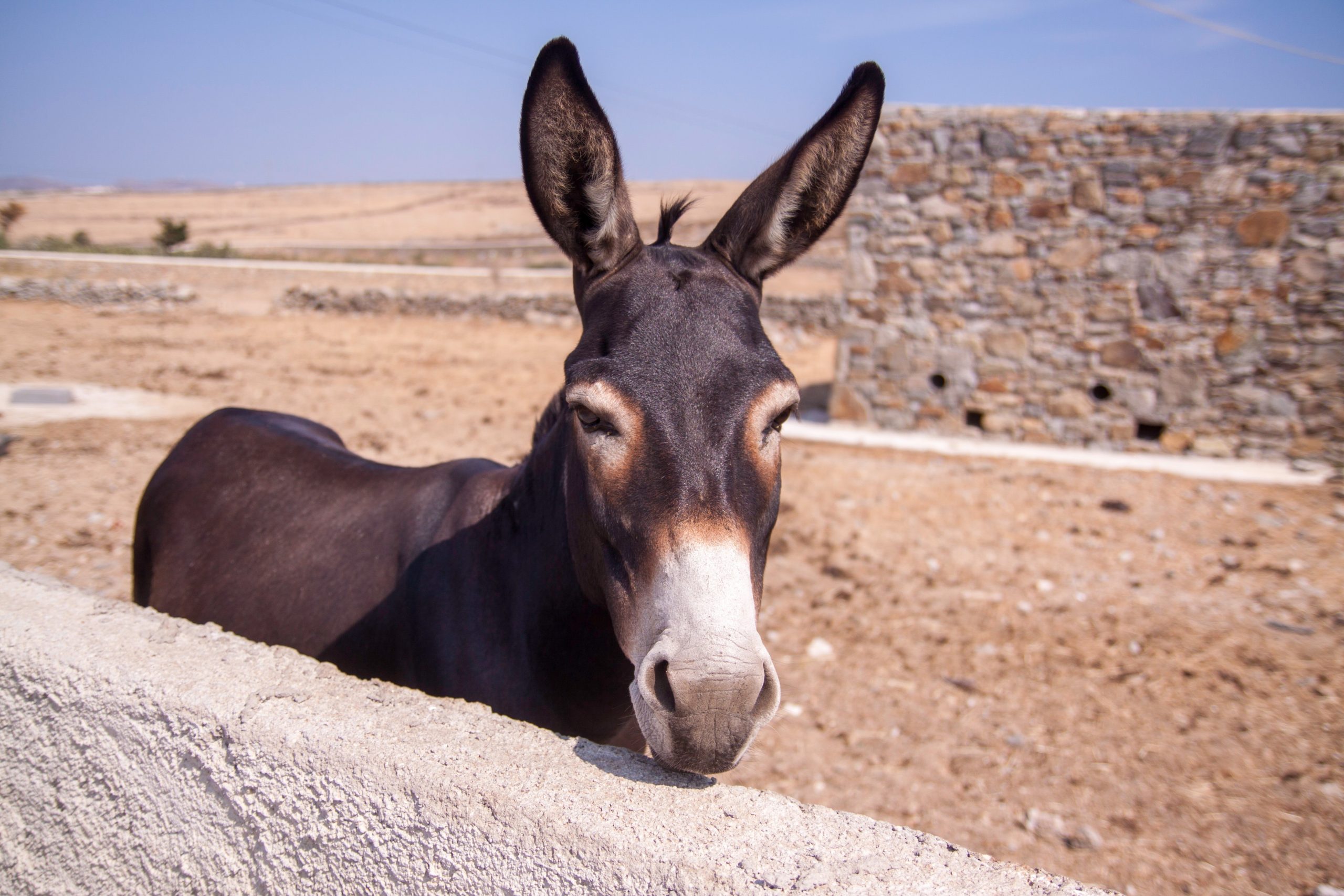Animal rights activists often pose the question: “If animals could speak, what would they say?” The Torah actually offers us an answer to this question, with an incredible talking she-donkey in the starring role.
Here’s the context: The Israelites are in the midst of their forty-year-long wanderings through the desert, during which they pass through the land of Moab. Balak, King of Moab, freaks out – there’s this huge nation of foreigners parading through his land, and he worries that “this horde will lick clean all that is about us as an ox licks up the grass of the field” (Numbers 22:4). Sound familiar? Anyhow, Balak calls the non-Israelite prophet, Balaam, to curse the Israelites, because Balak has heard that Balaam’s curses and blessings are very effective. Balaam saddles his she-donkey, and heads off to deliver the curse.
On the way, the donkey sees something Balaam doesn’t: an angel of G-d/dess in the middle of the road, holding a sword. The donkey swerves out of the way – understandably! Balaam, not seeing the angel, beats the donkey and turns her back into the road. The angel blocks the way again, this time between two vineyard fences, so the donkey swerves once more and presses Balaam’s leg into the wall. Again, Balaam beats the donkey and turns her back to where he wants to go. Finally, the angel places themself in a spot so narrow that swerving isn’t possible, but still Balaam doesn’t notice them. The donkey sits down in the middle of the road. Again, Balaam beats her.
At this point, the donkey has had just about enough of Balaam’s violence towards her, as well as his inability to see a quite-striking-angel-with-a-sword right in front of him. G-d/dess has had enough of Balaam’s behaviour, too, so S/he opens the donkey’s mouth: “What have I done to you that you have beaten me these three times?” (Numbers 22:28). The donkey’s cry is the cry of all animals who have ever been harmed by humans – what did I ever do to deserve this?! As my bar mitzvah student who has this parasha rightly noted, Balaam is so angry that he doesn’t realise that something truly incredible is happening – that his donkey is actually talking! He just ploughs on in rage and says to the donkey, “You have made a mockery of me! If I had a sword with me, I’d kill you” (Numbers 22:29). Balaam, at first, is much more worried about how stupid the donkey has made him look, rather than that a) his donkey is talking and b) his donkey is actually calling him out quite righteously. Toxic masculinity isn’t a new invention, it turns out, as Balaam is quite ready to kill the donkey just to prove that he won’t be humiliated. The donkey responds with a wise rebuke: “Look, I am the ass that you have been riding all along until this day! Have I been in the habit of doing thus to you?” (Numbers 22:30). Balaam responds with a sheepish, “No.”
It is then that Balaam is able to see the angel, and he bows low to the ground. The angel takes the donkey’s side, saying, “Why have you beaten your ass these three times? It is I who came out as an adversary, for the errand is obnoxious to me. And when the ass saw me, she shied away because of me those three times. If she had not shied away from me, you are the one I should have killed, while sparing her” (Numbers 22:32-33). The angel tells Balaam off for his treatment of the donkey, and goes even further, making it clear to Balaam that the donkey has just saved his life.
According the Torah, if animals could talk, they’d stand up for themselves. They’d call us out on our behaviour, challenging our violence towards them. And, they might even have perspectives on the world that we don’t. Just as Balaam’s donkey was able to see the angel that he couldn’t, so animals might have insight about our society or our ecosystem that we don’t. What might a battery hen have to say about the way she and her egg-laying colleagues are treated? What might an orangutan, whose habitat is being destroyed, say about the production of palm oil? What might the birds flying over our heads or settling in the trees in our local park have to say about air pollution? They have all experienced the impact of human behaviour on our planet in a visceral way that likely many of us reading this article have not.
Balaam, to his credit, is able to see the error of his ways. He says that if the angel doesn’t want him to, he won’t continue on his mission to curse the Israelites. The angel says that Balaam is free to go, but can only do what G-d/dess tells him. When Balaam overlooks the Israelite camp, and opens up his mouth, all he is able to say are blessings. Jews still recite one of these blessings every time we enter a house of prayer:
מַה־טֹּ֥בוּ אֹהָלֶ֖יךָ יַעֲקֹ֑ב מִשְׁכְּנֹתֶ֖יךָ יִשְׂרָאֵֽל׃
Ma tovu ohalecha Ya’akov, mishkenotecha Israel!
How beautiful are your tents, O Jacob, Your dwellings, O Israel!
-Numbers 24:5
So, next time you hear the words of Ma Tovu, think of Balaam’s talking she-donkey – of the way that she was able to call Balaam out on his mistreatment of her, and of the way that all animals, if they could speak, would have something very important to say to us.
*
Kohenet Yael Tischler is a ritual-weaver, Jewish educator and song leader. She is the co-founder of Yelala, a constellation of work that celebrates Earth-centred, feminist Jewish spirituality and reclaims the practices of our women/femme and folk ancestors. She holds an MA in Writing for Young People from Bath Spa University, a BA in English Literature from Columbia University and a BA in Tanakh (Bible) from the Jewish Theological Seminary.















